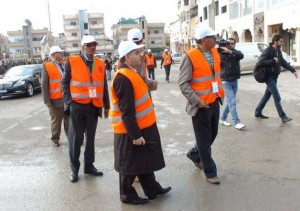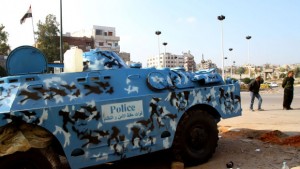
Activists accused President Bashar Assad’s regime on Wednesday of misleading Arab League observers by taking them only to areas loyal to the government and changing street signs to confuse them.
According to the activists, regime loyalists also are painting military vehicles still inside of cities blue to make them look like police vehicles — a ploy that allows the government to claim it has pulled the army out of heavily populated areas in accordance with the Arab League plan to end the crackdown on dissent. About 100 Arab League observers now in Syria for a week are supposed to be assessing whether the government is complying with the plan.

Foreign Ministry spokesman Jihad Makdissi denied the charges and said the government does not interfere with the observers, “but rather ensures protection and escort for them.”
The Arab League plan requires the government to remove security forces and heavy weapons from city streets, start talks with opposition leaders and free political prisoners.
The U.N. estimated several weeks ago that more than 5,000 people have been killed by Syrian security forces in the crackdown on the anti-government protests that began in March. Since that report, opposition activists say hundreds more have been killed.
French accuse Syrian regime of “massacres”
Arab League: Syria has removed tanks from cities
Syria’s opposition say the bloodshed has continued despite the presence of the observers. The Local Coordination Committees, an umbrella group of activists, put the death toll at more than 390 people since Dec. 21.
Opposition groups have been deeply critical of the observer mission, saying it is simply giving Assad cover for his crackdown. The mission’s chief, Lt. Gen. Mohamed Ahmed Mustafa al-Dabi, raised particular concern because he served in key security positions under Sudanese President Omar al-Bashir, who is wanted for crimes against humanity in Darfur.
“The observers are going to areas known to be loyal to the regime,” said Rami Abdul-Rahman, head of the British-based Syrian Observatory for Human Rights.
Another activist, Syria-based Mustafa Osso said the regime is mostly taking the observers to relatively calm areas, painting military vehicles blue and changing street signs so that the monitors go to wrong neighborhoods.
“Since the mission started the regime is limiting their (observers) movements and when they go out they are under the protection and supervision” of Syrian security, he said. “In Homs, they raised signs of Bab Sbaa in other neighborhoods.”
A resident of Homs, which has been one of the main centers of opposition to the regime, said buses carrying dozens regime supporters arrived in his neighborhood of Khaldiyeh last week shortly before the observers arrived. The crowds pretended they were residents and gave testimonials to the observers, said the resident, who witnessed the scene.
“All this happened as the monitors’ Syrian escorts prevented the real residents from reaching the observers,” said the man, asking that his name not be published for fear of reprisals. He added that the observers set up an office in a school in the Zahra neighborhood, which is staunchly pro-regime. As a result, nobody dared go to the office to complain, he said.
As the observers continued their mission Wednesday, security forces and pro-government gunmen shot dead at least three people, two in the province of Homs and one in the central province of Hama, the Observatory said. The LCC also said three people were killed Wednesday.
In Cairo, the League’s deputy secretary-general, Ahmed bin Heli, said that a meeting that was supposed to be held Saturday to look into the first report by the head of the monitoring mission has been postponed until Sunday because of the Egypt’s Coptic Christmas holiday.
CBS
Photo: Arab League monitors in Syria. Activists accused President Bashar Assad’s regime on Wednesday of misleading Arab League monitors by taking them only to areas loyal to the government and changing street signs to confuse them. According to the activists, regime loyalists also are painting military vehicles that remained inside the cities blue to make them look like police vehicles — a ploy that allows the government to claim it has pulled the army out of heavily populated areas in accordance with the Arab League plan to end the crackdown on dissent.

Leave a Reply
You must be logged in to post a comment.